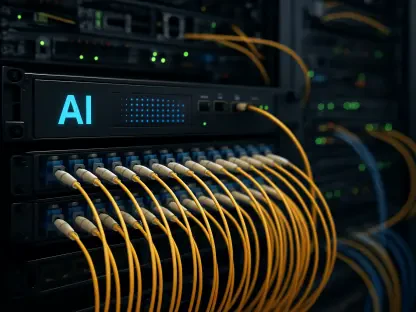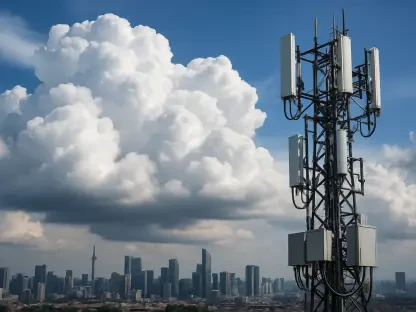Imagine a world where every manufactured device can seamlessly connect to the internet without the need for physical SIM cards or complex setup procedures. Such a world might soon become a reality thanks to Deutsche Telekom’s innovative MECC initiative, which stands for “Make Everything Cellular Connected.” This groundbreaking program aims to integrate IoT connectivity directly into products during their manufacturing process, thereby transforming the way the technology industry views and implements connectivity solutions. The initiative promises to streamline production, reduce costs, and open up new service options for manufacturers.
Streamlined Manufacturing and Cost Efficiency
Embedded IoT Connectivity
The MECC initiative primarily leverages nuSIM technology to eliminate the need for physical SIM cards by incorporating their functionalities directly into the chipset. By integrating the SIM card into the device hardware, manufacturers can reduce complexity and energy consumption right from the outset. This not only simplifies the manufacturing process but also renders the produced devices more energy-efficient. Furthermore, the embedded nuSIM supports features like device status messaging and remote configuration, making it easier for manufacturers to manage and maintain devices post-production.
The absence of physical SIM cards allows IoT-enabled products to be manufactured in a more streamlined manner, reducing both labor and materials costs. Connectivity costs are incurred only when the device is activated, offering immediate financial savings to manufacturers. This economic model, where costs arise only upon connectivity activation, significantly reduces the financial risk associated with large-scale production runs. Manufacturers can thus focus on incorporating the required hardware during mass production without the immediate burden of connectivity expenses.
New Service Options and Economic Savings
A major theme of the MECC initiative is its potential to introduce new service options for manufacturers, including remote maintenance and status updates. Pre-installed IoT modules with integrated SIM and connectivity provide stable and minimal data usage, which drastically simplifies the process of connecting devices to cellular networks. These features enable manufacturers to offer added service layers to their products, which could include remote diagnostics, automatic updates, and real-time status monitoring. Such capabilities can lead to improved product performance and customer satisfaction.
Economic savings are further realized as the MECC initiative promotes a model where actual connectivity costs emerge only upon device activation. This approach ensures that manufacturers only spend on active devices, making the entire process more cost-effective. Standby connectivity, available at a rate starting from 10 euros per device annually, offers the flexibility to upgrade to an IoT Business LPWA data plan based on business needs. This standby connectivity allows manufacturers to gain insights into user behavior and optimize their products accordingly, offering an adaptable and scalable solution.
Flexibility and Future-Proof Solutions
Standby Connectivity for Manufacturers
One of the innovative aspects of Deutsche Telekom’s MECC initiative is the inclusion of standby connectivity, which provides manufacturers with the flexibility to upgrade to more robust data plans as needed. Starting from a modest rate of 10 euros per device annually, manufacturers can opt for an IoT Business LPWA data plan according to their specific business requirements. This flexibility ensures that manufacturers can start with basic connectivity options and scale up as their operational needs evolve.
The integration of standby connectivity allows devices to stay connected even with minimal data usage, which is ideal for scenarios where devices require periodic updates or status checks. This capability also enables manufacturers to gather valuable insights into user behavior and device performance, facilitating continuous improvement and optimization of products. The ability to remotely configure and update devices adds a layer of future-proofing, ensuring that products remain relevant and functional over their lifecycle.
Impact on the IoT Ecosystem
Deutsche Telekom’s collaboration with industry leaders like Nordic Semiconductor and PSsystec showcases the initiative’s potential to reshape the IoT ecosystem. By embedding connectivity directly into the production process, the MECC initiative simplifies the transition of products from manufacturing to activation, offering a seamless experience for both producers and end-users. This level of integration signifies a milestone in IoT technology, fostering greater innovation and development within the industry.
Manufacturers stand to benefit from a more efficient production process, reduced costs, and enhanced service capabilities. The initiative’s approach to integrating IoT connectivity during production presents a new paradigm in manufacturing, where the hardware is ready for immediate activation and use. This makes it easier than ever to bring connected devices to market, encouraging broader adoption and more versatile applications of IoT technology. As a result, the MECC initiative is poised to have a lasting impact on the way industries approach connected devices.
Showcasing at Mobile World Congress
Presentation and Collaboration
Deutsche Telekom, along with Nordic Semiconductor and PSsystec, plans to showcase this revolutionary advancement at the Mobile World Congress from March 3 to March 6 in 2025. The presentation is scheduled for March 5 at 10 a.m., and it is expected to draw considerable attention from industry leaders and tech enthusiasts alike. This event will offer a firsthand look at how the MECC initiative operates and highlight its potential to revolutionize the IoT landscape.
The collaboration between Deutsche Telekom and its partners underscores the importance of combined efforts in driving technological advancements. By pooling resources and expertise, these companies aim to demonstrate the real-world applications and benefits of the MECC initiative. Attendees of the Mobile World Congress will gain insights into how embedded connectivity can be seamlessly integrated into the production process, leading to more efficient and cost-effective manufacturing practices.
Future Considerations
Imagine a world where every device created can effortlessly connect to the internet without needing physical SIM cards or complicated setup procedures. This vision is on the cusp of becoming reality thanks to Deutsche Telekom’s pioneering MECC initiative, which stands for “Make Everything Cellular Connected.” This innovative program aims to embed IoT connectivity directly into products as they’re being manufactured, revolutionizing the way the technology sector perceives and implements connectivity solutions. By integrating connectivity at the production stage, the MECC initiative promises to simplify the manufacturing process, lower costs, and create new service opportunities for manufacturers. This advancement could significantly alter the tech landscape by providing seamless internet integration for an array of devices, simplifying user interactions, and enabling smarter, more connected products. Manufacturers could then offer a broader range of services, enhancing value for end-users and potentially transforming how everyday objects interact with the digital world.









